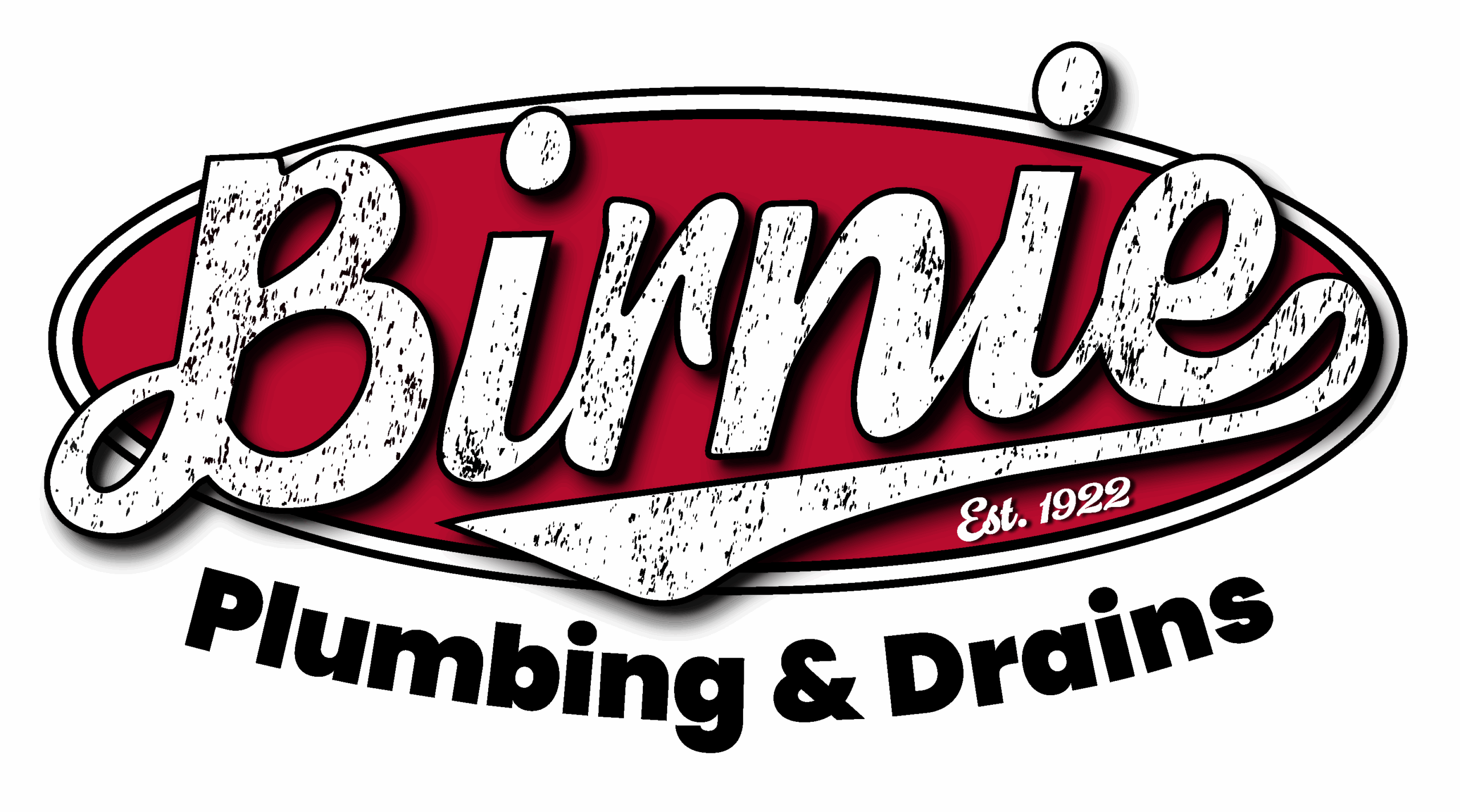How to Get Rid of Kitchen Sink Smell

Your kitchen is an important place to store, prep, cook, and serve food. Most homeowners clean their kitchens multiple times a week to keep everything fresh and tidy. Without proper hygiene, it’s easy to attract funky odours that may smell like sewage or rotten eggs. You must pay extra attention to sanitizing the sink, an area that can get notoriously dirty.
Various issues may arise under the kitchen sink. There is potential for moisture to accumulate because the condensation on pipes creates mildew and mould. You may also have leaks that cause standing pools of smelly water. Another problem is blocked plumbing under the kitchen sink, which prevents sewer gases from leaving appropriately. These complications require the expertise of a professional plumber.
Whatever the problem is, you should not ignore the kitchen sink smells. The foul stench won’t go away on its own, creating an unpleasant atmosphere before food prep and mealtimes. The longer you delay action, the more difficult it is to clear away the odours. Here is a guide on how to get rid of the kitchen sink smell:
Clean & organize under kitchen sink
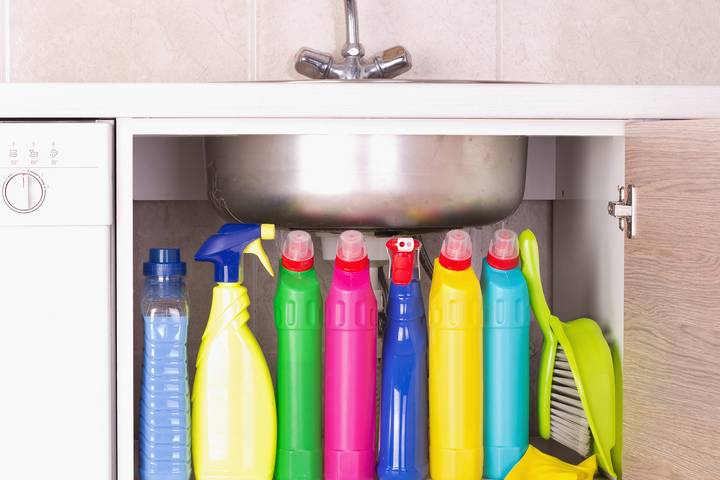
Many homeowners use the area underneath a kitchen sink as a convenient storage space. It is easy to reach down and grab a product for everyday household chores. You may store items like cleaning supplies, trash bags, garbage cans, and other knickknacks. The more clutter you have, the harder it is to spot a problem with your kitchen plumbing system.
Start by taking everything out and washing each item as you go. A cloth with soap and water or a vinegar spray with paper towels will do the trick. After emptying all the supplies, you will have a clean slate under the kitchen sink. Now, you can look further and investigate the smells coming from the kitchen plumbing system.
Mould in kitchen sink
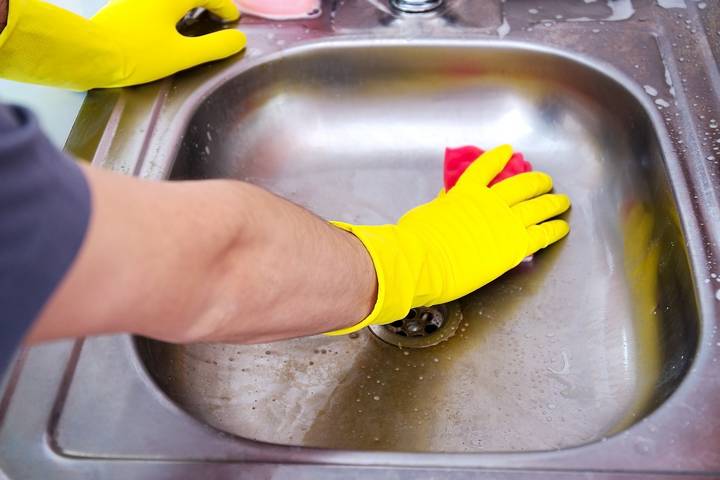
Inspect for any signs of mould under the kitchen sink. Give every surface a good clean with vinegar to eliminate bacteria. Then, focus on the problem areas that look like mildew or mould. Spray these spots heavily and allow the vinegar solution to sit for 15 minutes. The process could be a little intense, so leave the room if necessary. Remember to wash your hands so that you don’t spread any mould spores around the home.
After your waiting period, come back and wipe the affected surfaces with paper towels or an old damp cloth. If needed, you can apply a second application of vinegar to ensure you fix the problem. You can use a diluted bleach mixture and a cloth to wipe metal surfaces like pipes. However, wear a mask because you are working in a confined space. After the solution dries, wash with a sponge or cloth to remove any remaining residue.
Leak under kitchen sink
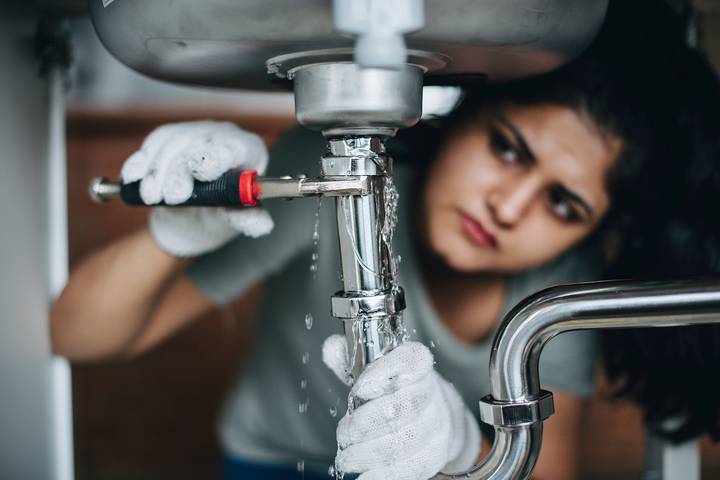
It’s time to look for pipe leaks that cause standing water under the kitchen sink. A musty smell might indicate a water leak from several possible sources. Check all connection areas of the pipes to see if they are leaking.
Start by inspecting the faucet and see if there is any water pooling around the base. It can also leak through the counter opening and drip onto the bottom of the cabinet. Next, focus on the kitchen sink drain. A drain is sealed tightly with putty, but it can get worn down over time and start to leak.
Then, inspect for leaks in the water supply. This area is where your hot and cold water connects to the sink. If the connections aren’t tight enough, they can drip constantly. Your final inspection is to search for leaks from worn-out plumbing parts. O-rings, washers, and seat valves don’t last forever. As they wear down, water can escape from your plumbing fixtures.
Clogged kitchen sink

Sometimes, the kitchen sink smells originate from a clogged trap or vent pipe. Water is supposed to sit in the U-shaped trap under the sink so that sewer gases cannot escape. The vent pipe allows this gas to leave your home safely. If either component is clogged, the sewer gas cannot exit properly. Instead, it may escape through your kitchen sink, and you will get a noticeable stench that smells like sewage.
Clear the blockage with DIY remedies. Start with boiling water poured down the drain. Try it a couple of times to see if this technique will penetrate the clog. If unsuccessful, use baking soda and vinegar poured separately down the drain. Let its chemical reaction try to dissolve the clog for 15-30 minutes. Follow up with warm water to wash away the residue. Hopefully, this home remedy clears the clogged kitchen sink. If not, call a drain cleaning plumber for help.
How to clean kitchen sink
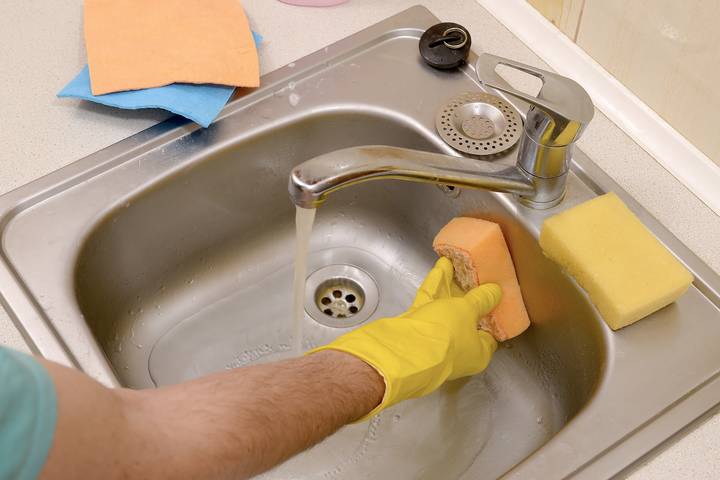
After getting rid of the kitchen sink smells, you should consistently keep the area clean. Regularly wipe down the kitchen sink surfaces, faucets, handles, and pipes. If you store some cleaning supplies under the kitchen sink for convenience, organize the area to avoid clutter. Also, watch for any standing water to identify the sign of a new leak. Contact a plumber if you suspect there are leakages or blockages.
